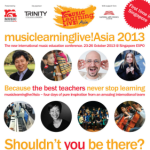 I met one of my sons just before I came out to Australia. “How’s it going?”, I asked.
I met one of my sons just before I came out to Australia. “How’s it going?”, I asked.
“I don’t know”, he said, “but I think I’m on the cusp of something.”
“That’s great”, I replied, “cusps are always good.”
Now I know I may be accused of naive optimism, but I really think that educators are on the cusp, too. The personal events of the past week have underlined to me that the axis, around which teachers and policy makers judge their influence, has tilted, perhaps irrevocably. This morning I was slightly humbled to moderate a Twitter conversation around the themes of OPEN. We had contributions from the UK, Indonesia, Canada, USA, Singapore and of course Australia. (The storify of today’s #satchatoc is HERE) We take these kind of collaborations for granted these days that it’s worth just underlining what happens each time these online gatherings take place – people from all over the world come together to freely give of their knowledge, passion, techniques and, yes, mistakes. There used to be this thing called intellectual property – whatever happened to that?
There also used to be this thing called professional compliance, too: we used to sit around waiting for the latest government diktat before deciding what we could do in our professional practice. For a growing number of school leaders, those days are gone, too.
For two days this week in Melbourne, I co-facilitated the first gathering of some of Australia’s leading schools in the critical formation stage of the Australian Institute for Teaching and School Leadership’s ‘Learning Frontiers’ programme. It’s the formation of the first collection of ‘lab’ schools – many more will follow over the coming months. The Case for Change has received widespread support from Australian teachers, but that’s just the first step. Knowing what’s wrong is important, but asking yourself the hard questions in order to bring about systemic change, that’s an act of faith.
To be honest, I think the first hour or so felt a bit like they were waiting to be told what to do by this government agency.Once they started talking about ‘fire in the belly’, however, and we started grappling with the challenge of student engagement, the ideas flowed and the ambition soared. By the end of the first day leaders from Birdwood High School and the Australian Science and Mathematics School in Adelaide, and Northern Beaches Christian School and Campbelltown Paerforming Arts High Schol in Sydney had mapped out their burning questions:
- How will we utilise student passion to shape co-created work to enable heightened engagement and improved learning outcomes?
- How do we ensure intellectual stretch when students co-design learning?
- How can community and learning environments make student learning authentic?
- How do we look beyond traditional school boundaries to connect with student passions?
- How do we personalise learning to deeply engage students?
- How can we develop, implement, scale and sustain authentic integration of subjects for high learning and engagement?
- How can we integrate subjects so they are grounded in the real world context?
- How do we ensure that every student uses meaningful feedback to enhance their learning?
And that is just the tip of the iceberg. There are layered sub-questions, like ‘How do we take the ‘pockets of brilliance’ around assessment for learning and scale to ensure it is embedded?’, or ‘How effectively does an interdisciplinary curriculum connect learning with real world applications of knowledge and assessment methodologies?’ (I will share their plans for how to achieve all this in subsequent posts)
Deep, profound, questions that leading Australian schools are asking themselves, not because the government is insisting they do, but because they want to. And they want to share their experiences with anyone who is interested, through their about-to-be-formed ‘hubs’.
This is how to de-privatise teaching. This is how schools will self-determine their future. This is OPEN learning at its best.


Hello David
Thanks for the useful post. I’m looking forward to initiating conversations about de-privatising schooling around the coffee machine in my staff room.
One new realization for me is that I need to aim for my students to USE my meaningful feedback. I’m mulling over how I can include this is my student-teacher conversations and reflections. I used to think that ‘feedback’ was something teachers did. Now I think it’s something students use.
Another realization was that I need to reconnect with the global learning world. I want to look beyond my own school for connections. I want connections that will answer their learning needs – via their passions.
Lucky me – this blogpost and yesterday’s Twitter #satchatoc have been the professional learning makeover that I needed!
Cheers
Brette Lockyer
@brettelockyer
Brette, I’m glad you found it helpful. The schools in question were looking at feedback in its broadest sense. For example, how might students provide feedback for each other? How might we use social media to source global expertise to offer feedback?
So many possibilities.